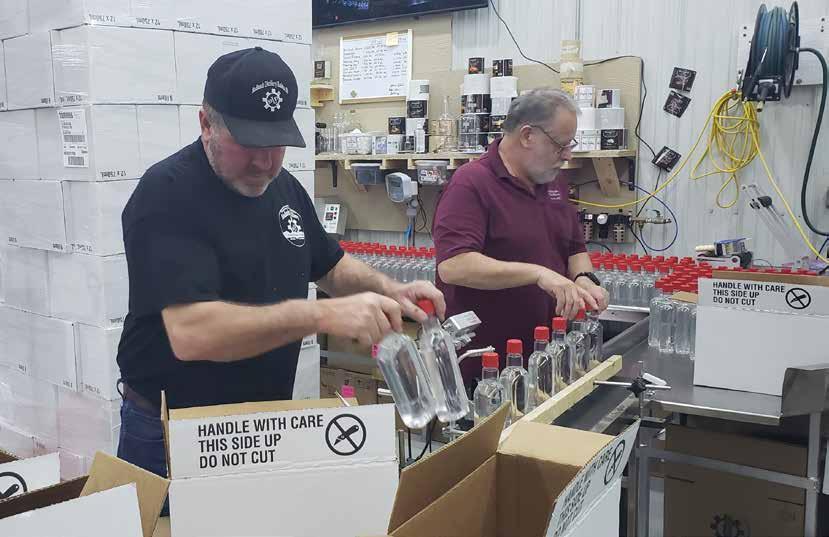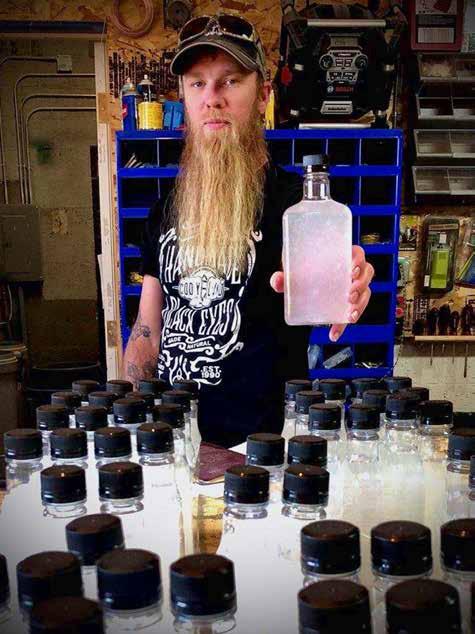
4 minute read
From Spirits to Sanitizer
BY DEANNA NELSON-LICKING

Badlands Distillery in Kadoka, South Dakota is now manufacturing hand sanitizer.
The panic buying and hoarding in March 2020 due to the COVID-19 outbreak, has led to a shortage of many cleaning, disinfecting and sanitizing products. Even hospitals and doctors’ offices have run short and the manufactures are unable to keep up with the high demand. In response to the shortage the federal government has temporarily waived regulations to allow distilled spirits plants (DSPs) the ability to produce hand sanitizer. The distilleries have to follow the Food and Drug Administration’s formula of at least sixty percent denatured alcohol and having no dyes,
fragrances or lotions added. Rising up to help fill the need, small distilleries across the nation have stepped up to the challenge of changing their production from hard spirits to hand sanitizers.
Badlands Distillery in Kadoka, South Dakota has switched gears from making bourbon to producing hand sanitizer. “After hearing some national news about the different shortages caused by the virus, we asked around at our local businesses how their supply of sanitizer had been and were surprised to hear they too were having trouble getting the product,” said Sandra Eschenbacher, Marketing and Sales Manager for Badlands Distillery. “I couldn’t imagine hospitals and nursing homes and other frontline people rationing sanitizer or having no supply at all. In the week preceding, we received multiple updates from the TTB (Treasury Tax Bureau, governing distilleries) and distillery groups through emails who were encouraging distilleries to help out. We felt we had the facility and capability and decided to go full steam ahead knowing that we would have to iron out the snags, we were sure to hit, along the way,”

Badlands Distillery partners Mark Eschenbacher and Jim Herber (Jim in the hat) packaging bottles of hand sanitizer.
They weren’t prepared for the response to the announcement they were making hand sanitizer.
“After we got a few days into the project, we realized just how severe the need was state wide, as hundreds of calls and emails poured in. We were lucky to have a big quantity of 1.75ml bottles on hand normally used for liquor production that we decided to get started with. We did hit a few delays in trucking shipment of glycerin, a few challenges with regulations, FDA, additional licensing, labeling, etc. but overall we worked through it. Quickly we realized we would need much more product to fulfill the orders. Ringneck Energy stepped in to help provide sales of product to meet the demands of manufacturing sanitizer,” Eschenbacher said.
Badlands Distillery never imagined the turn this would take in their business. They ran their first still run on Jan. 1, 2016 and released their first two-year aged bourbon last May. They currently self-distribute throughout South Dakota to many liquor stores and several bars and are always adding to their list. Along with barrels of traditional bourbon they have rye whiskey and brandy aging in barrels that will be released at some date in the future, as it takes time to mature.
“The corn used in our bourbon mash is grown on the ranch. We are grateful for all our businesses that continue to support us in carrying our spirits and the patrons who enjoy them. And mostly we depend on everyone’s patience as we work to get the sanitizer out to the public,” Eschenbacher said.

Casey Miller of Lazy RW Distillery in Moorefield, Nebraska holds a bottle of their hand sanitizer.
Lazy RW Distillery in Moorefield, Nebraska, was founded in August of 2015, by father and son team Bill and Todd Roe. What started out as a fascination with old journals from a great uncle, who operated a still on the Niobrara River in prohibition days, has now become a fully licensed whiskey distillery. “Dad and I started this hobby in his shop, and then since the government wouldn’t let us operate that close to a home we moved to the old school in Moorefield,” Todd Roe said.
“I was a structural engineer for nine years before going full time in this business. There are four of us working here and we have a huge following now in Nebraska and South Dakota. We use Nebraska corn but since we are selling in South Dakota now, we just purchased corn from there. We are a small distillery with huge standards of quality. We look forward to providing a high-end product for many years to come.”
After the government changed the rules allowing distilleries to manufacture sanitizer, the Roes were on board with changing their products.
With most hand sanitizer being very drying to the skin, Lazy RW sanitizer uses xanthan gum, which leaves hands soft and non-irritated.
“The biggest thing we had to do was bottling and using smaller bottles than we use for our whiskey. We ended up using bottles we had on hand for another project. We try to be fair and keep the costs down. We are covering our costs, but it has been tight. Just making the conscious decision that we aren’t going to be making much money but we are going to stay afloat and everyone still has a job,” Roe said.
“The reason we decided to keep the cost down was for small businesses,” he said. “And trust me for a guy who has used maybe two squirts of hand sanitizer in my life, it has been a big adjustment to be making it now.”
For the sanitizer they are using the corn sugar made in Brady, Nebraska by Casey Miller that would be used ordinarily to produce whiskey. The sugar is transported to Moorefield for the distilling process. So far they have produced over four hundred gallons with 80 percent going to small businesses, nursing homes, Nebraska State Patrol, local sheriff offices and first responders.










